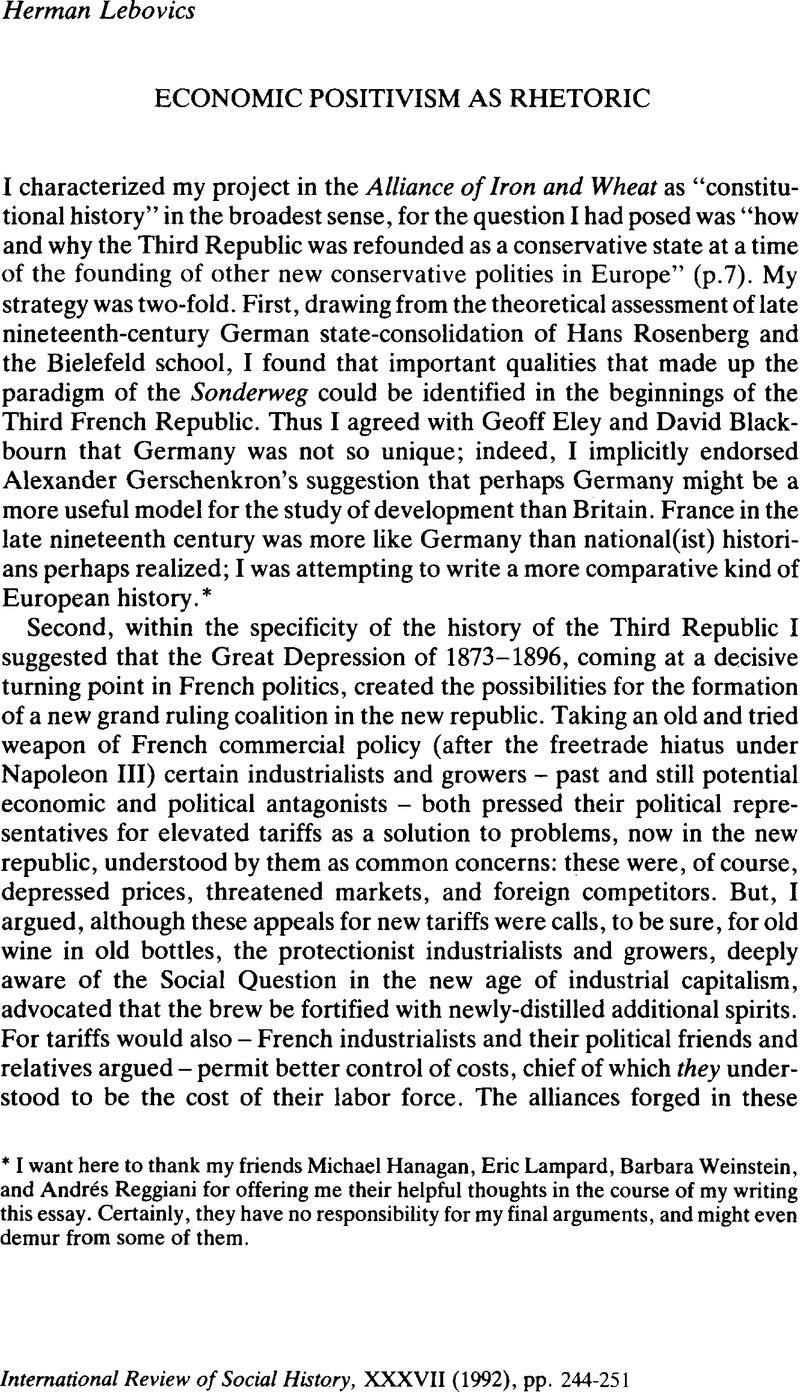No CrossRef data available.
Article contents
Economic Positivism as Rhetoric
Published online by Cambridge University Press: 18 December 2008
Abstract

- Type
- Suggestions and Debates
- Information
- Copyright
- Copyright © Internationaal Instituut voor Sociale Geschiedenis 1992
References
* I want here to thank my friends Michael Hanagan, Eric Lampard, Barbara Weinstein, and Andrés Reggiani for offering me their helpful thoughts in the course of my writing this essay. Certainly, they have no responsibility for my final arguments, and might even demur from some of them.
1 In confirm ation of what I will argue below, Smith may not be the best reader of his own work. There are no social issues discussed in the body of his book. In his Introduction (pp. 23–25), and the Conclusion (pp. 239–254) he makes general unsupported statements about the constellations of social forces in the Third Republic. “Peasants”, “workers”, and “strikes” do not merit entries in his Index. It goes beyond the evidence he presented in his Tariff Reform in France for him now to claim that he too “portrayed” the conservative alliance of industrialists, big landowners, and peasant farmers as attempting “to defend the Third Republic against the attacks of the disaffected, notably the rising industrial working class”.
2 Letter of Michael Hanagan to the author, 10 February 1991. See further Hanagan and Miriam Cohen, “Welfare Capitalism and Heavy Industry: Birmingham, Pittsburgh, and Saint-Etienne, 1900–1930”, paper presented to the annual meeting of the American Historical Association, Chicago, December 1991.
3 Letter to the author by Eric Lampard, 1 March 1991.
4 McCloskey, Donald N., in The Rhetoric of Economics (Madison, WI, 1985), p. 15, endorses Ludwig von Mises's conclusion that foretelling the economic future is “beyond the power of any mortal man”. He also reproduces the contents of a humorous memorandum – with an edge of healthy professional self-doubt – which staff at the office of the U.S. President's Council of Economic Advisors compiled in May 1983 containing such wonderful principles as the “‘Makiw's Maxim: No issue in economics has ever been decided on the basis of the facts.’ ‘Nihilistic Corollary I: No issue has ever been decided on the basis of theory either.’ ‘Frisch's Restatement: Never let the facts stand between you and the right answer.’ ‘McCaleb's Policy Prescription Principle: All policy implications drawn from economics are matters of faith’ (p. 31).”Google Scholar
5 Smith's understanding of how tariffs work seems soft. His assertion that as a consequence of the increases in import prices due to elevated tariffs domestic producers can choose to raise prices or enhance their share of the domestic market assumes that there is no serious domestic competition – which is nonsense – and that foreign firms might not begin doing business in France – as British textile makers did – to get around the tariffs.
6 This understanding of economic depression coexisted with a continuing faith in Say's Law which asserts that production creates its own consumption. Fortunately, unlike economic agents maximizing utility, mentalités are not obliged to be rational constructs.
7 American Historical Review, 94 (10 1989), pp. 1113–1114.Google Scholar
8 Barbara Weinstein's forthcoming study of Brazilian industrialists' rationalizing efforts from the 1920s to the 1960s reassesses the widespread conviction found in the scholarship on the importance of the role of class conflict in the movement.
9 Arjo Klamer suggests as a topic of interest for economists today “not to know how we, from an Archimedean position, can design rational criteria of truthfulness; it is instead to comprehend how economists [I would add here, and businessmen speaking on public policy, HL] actually argue and how their arguments work”. Klamer, Arjo, “As if Economists and their Subjects were Rational”, in Nelson, John S., Megill, Allan, McCloskey, Donald N. (eds), The Rhetoric of the Human Sciences: Language and Argument in Scholarship and Public Affairs (Madison, WI, 1987), pp. 163–183; quote on p. 163.Google Scholar


